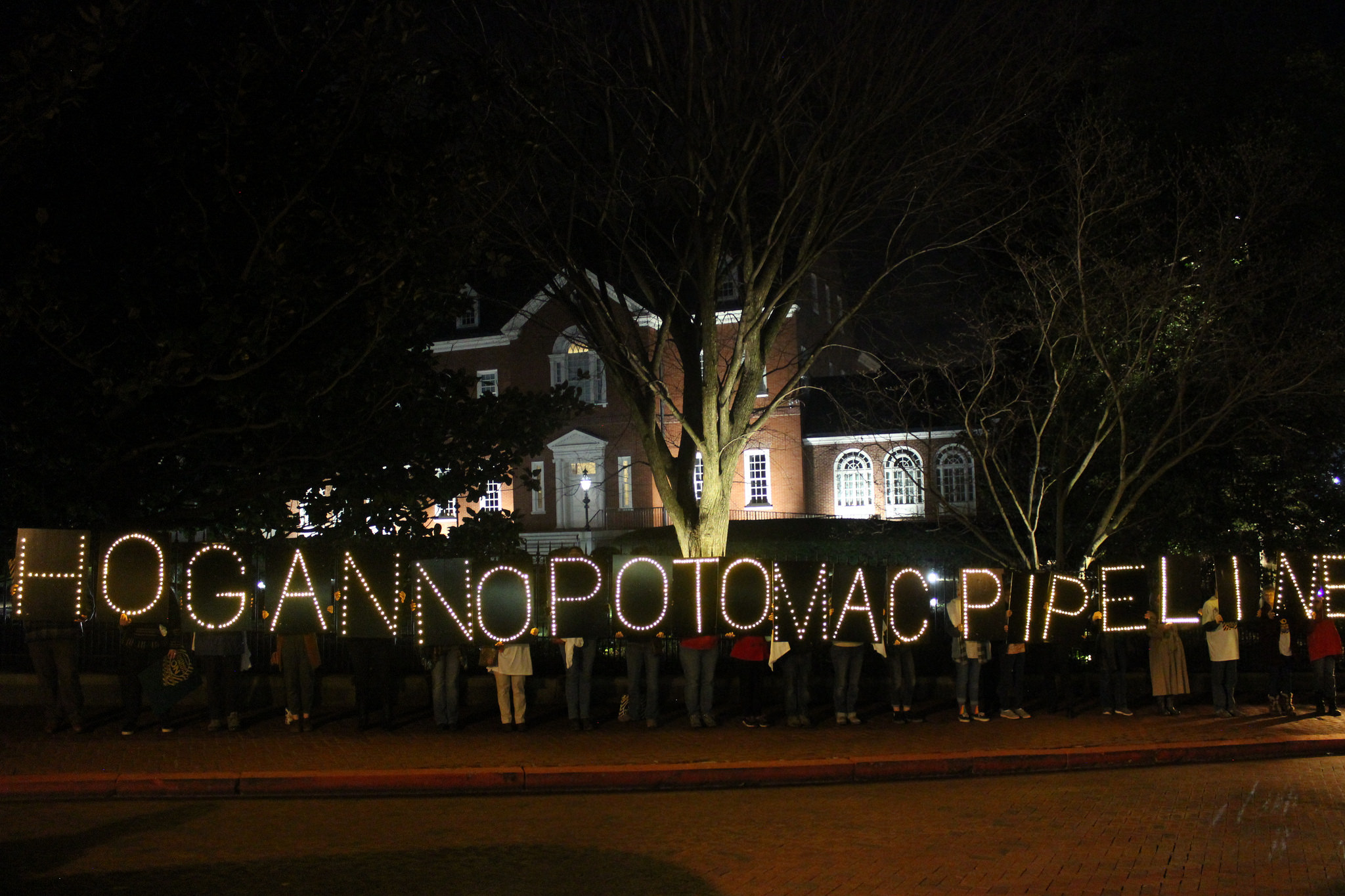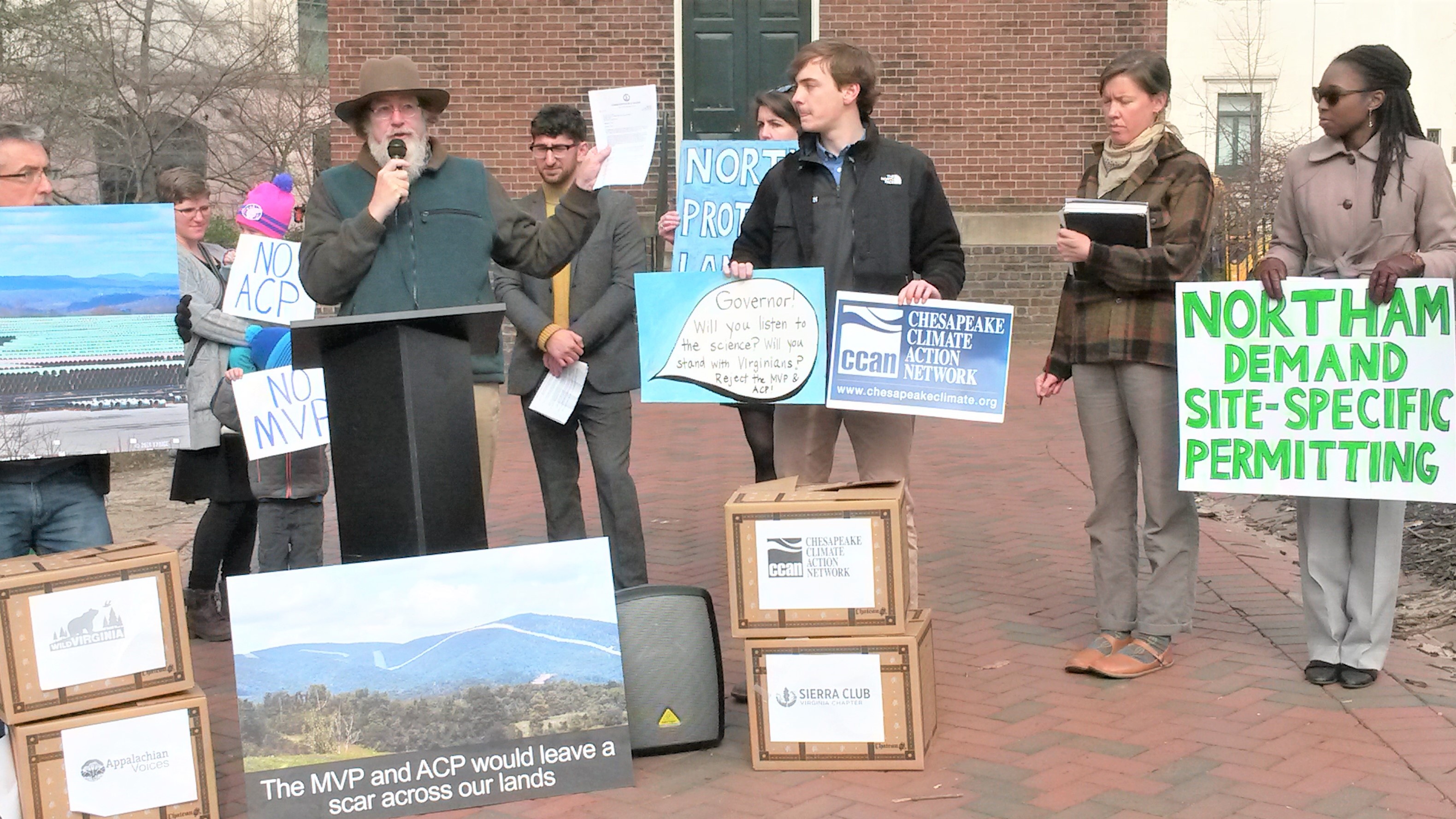In a peaceful action called “Mothers Protecting Mother Earth,” five mothers from Maryland and West Virginia blocked the steps of the Maryland State House outside Governor Larry Hogan’s office until they were arrested to protest the Governor’s support for the Potomac Pipeline.
Organizers also released a protest letter to Hogan from national environmental leaders and celebrities, including writer Bill McKibben and filmmaker Josh Fox.
ANNAPOLIS, MD- Today, five mothers were arrested outside the Maryland State House during a peaceful sit-in to oppose Governor Larry Hogan’s support for TransCanada’s proposed Potomac Pipeline for fracked gas. The action is the latest escalation against Governor Hogan’s plan to bring large amounts of fracked gas into and across Maryland via multiple pipelines at the expense of the environment and ratepayers.
High definition photos available via Flickr.
The mothers successfully blocked the front entrance of the State House for nearly two hours before they were arrested for trespassing. As a show of support, the arrestees were joined by various speakers, including Maryland legislators Delegate Jheanelle Wilkins (D-20) and Delegate Robbyn Lewis (D-46), who spoke in support of their action without participating in the civil disobedience. The protesters will also joined in solidarity by dozens of environmental advocates who have been leading the movement to oppose the Eastern Panhandle Expansion Project. Known as the “Potomac Pipeline,” this pipeline would transport fracked gas from Pennsylvania through Maryland, underneath the Potomac River, and into West Virginia for combustion. The pipeline is part of a full network of controversial fracked-gas infrastructure supported by the Governor despite his declaration of support in January for the Paris Climate Accord. New scientific data suggests that fracking is dramatically worse for the climate than previously understood.
“I love my children and grandchildren,” said Jean Cushman, an arrestee from Maryland. “What will happen to our children when there is no clean air or clean water — and more wildfires, droughts and floods? Governor Hogan can stop this pipeline and that is why I risked arrest.”
“Here’s what keeps me awake at night: wondering what the world will look like when my children and then my grandchildren reach my age,” said Liz Feighner, an arrestee from Maryland. “We need to stop fooling ourselves that fracked gas is a bridge fuel. We are out of time for half measures; as Bill McKibben says, winning slowly on climate change is the same as losing. So, here I am, a mother and grandmother, who sees no other way but to get in the way — for all children and grandchildren. Governor Hogan: Stop this pipeline.”
On Wednesday, local organizers also released a letter opposing the pipeline from some of America’s best known climate change and fracking activists. The protest letter, signed by 11 national leaders including writer Bill McKibben and filmmaker Josh Fox, calls on Governor Hogan to honor his pledge to uphold the Paris Climate Agreement by rejecting fracked gas pipelines like the Potomac Pipeline and embracing renewable energy instead.
The day after the arrests — Thursday, March 15 — is the deadline for the Maryland Department of Environment to decide whether to fully protect Marylanders’ health with a state-based “401 Certification” process under the Clean Water Act. Such a process would look cumulatively at the impacts to Maryland’s water from this pipeline and give MDE the authority to reject the pipeline. Without going through this process, Governor Hogan would essentially be approving the pipeline and handing over key regulatory powers to the Trump Administration.
Elizabeth Freeman, an arrestee from West Virginia, stated: “I am standing up to the fossil fuel community and the government agencies who are not taking the ramifications of this pipeline seriously. Pushing this through without full awareness is unconscionable, and our children will bear the burden of this recklessness.”
Pam Dehmer, an arrestee from Maryland, stated: “Everyone has a responsibility to protect and keep our planet safe from fracked gas, which pollutes our air, water and soil. Maryland banned fracking in our state — building new pipes to carry fracked natural gas through our state is taking a step in the wrong direction. We must immediately stop unsustainable oil and gas practices and build our economy around clean, renewable energy.”
Lynn Moses Yellott, an arrestee from West Virginia, stated: “Real change occurs when 3.5% of people are politically activated. I’m hoping that our actions today will inspire others be part of that 3.5%; to stand up to stop climate change; to stand up to demand that we quickly transition to alternative energy sources; to stand up to reduce consumption. Our children and grandchildren are depending on us.”
Since signing a ban on fracking in 2017, Governor Hogan has worked consistently to undermine the spirit — if not the letter — of the law. Documents show that Governor Hogan collaborated with TransCanada to allow the Canadian gas company to carry out a dangerous drilling method called “Horizontal Directional Drilling” without oversight from the Maryland Department of Environment. And despite repeated pleas from groups ranging from the Potomac Riverkeeper Network to the Chesapeake Physicians for Social Responsibility, the Hogan administration refuses to follow a standard set by Virginia and other states when it comes to reviewing impacts to water quality from fracked-gas pipelines.
Governor Hogan also supports using settlement money from the proposed merger between Washington Gas and Calgary-based AltaGas to construct fracked-gas pipelines at the expense of Maryland ratepayers. Governor Hogan has advocated for a virtually unprecedented settlement wherein the state of Maryland would spend $33 million in settlement money to assist gas companies in the construction of more fracked-gas pipelines all across Maryland. The settlement — which must be approved by the Maryland Public Service Commission later this year — also requires that AltaGas spend an additional $70 million (which could be charged to ratepayers) to promote pipeline construction and other fracked-gas infrastructure in the state.
Brooke Harper, Maryland Policy Director of the Chesapeake Climate Action Network, stated: “Last year, Governor Hogan promised to protect Marylanders from the threat of fracking when he signed a statewide fracking ban. Now, he’s reneging that promise by bringing fracked-gas infrastructure all across Maryland — and allowing dirty Canadian energy companies to do so in a way that threatens all of us. Governor Hogan, it’s time for you to stop this pipeline once and for all.”
Delegate Jheanelle Wilkins (D-20) stated: “I stood with my constituents last year when they called on Maryland legislators to protect their water, by passing a permanent fracking ban. I’m standing with them again to protect Maryland’s drinking water from fracked-gas infrastructure. I’m calling on Governor Hogan say no to TransCanada’s unnecessary pipeline.”
Delegate Robbyn Lewis (D-46) stated: “Thousands of Marylanders have expressed deep concerns about the Potomac Pipeline. Will they all be ignored? This proposed pipeline will spur more harmful fracking and more planet-warming emissions and threaten our most vulnerable communities. Let’s put an end to this madness.”
This action culminates nearly a year of opposition to this pipeline across Maryland, West Virginia, and Washington, D.C.
Organizations supporting today’s action include the Chesapeake Climate Action Network, Eastern Panhandle Protectors, Potomac Riverkeeper Network, Frack-Free Frostburg, and Food and Water Watch.
###









